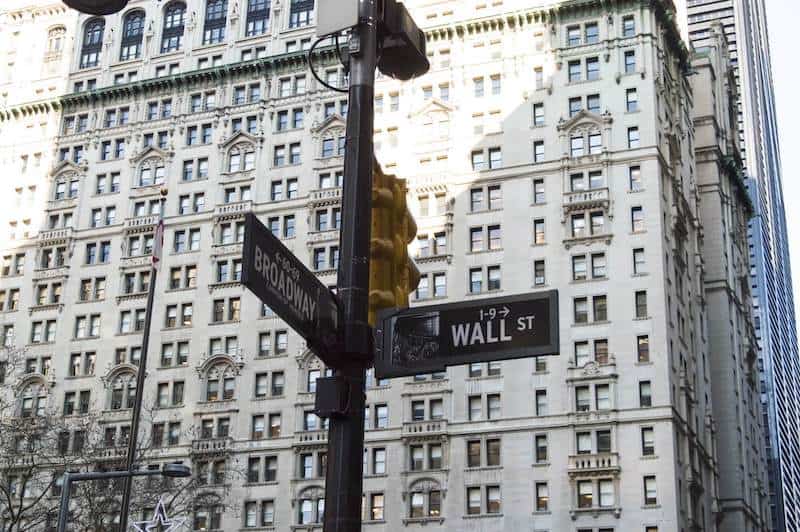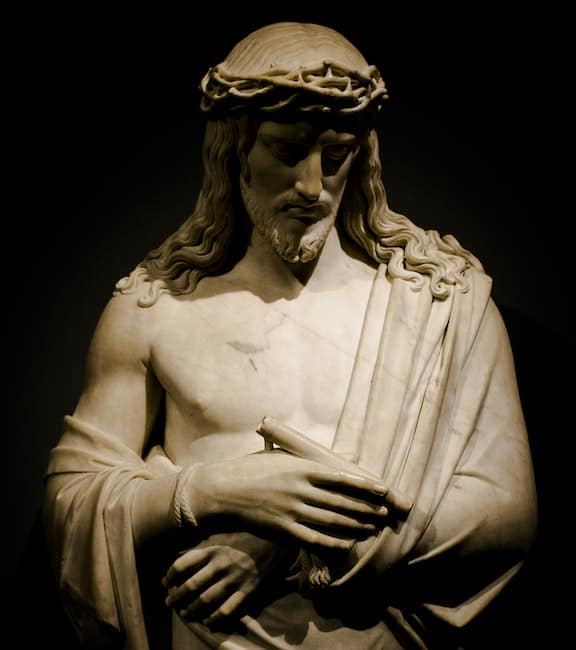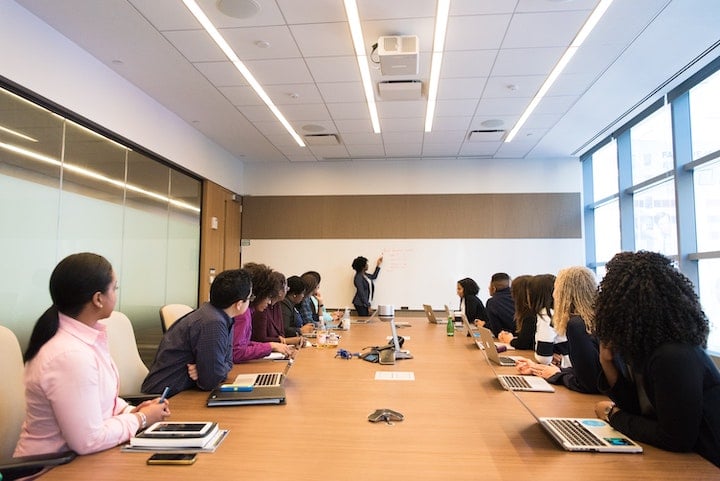Catholic Social Teaching and Economics
Important Source of Wealth
Serve the Common Good
What is the Role of Profit?
Rooted in Human Freedom
Goods Must Benefit all Humanity
What Must the State Do?
The Church Supports Free Markets
A Free Market
A “business economy has many positive aspects – its basis is human freedom exercised in the economic field.”
“It would appear that at the national and international level the free market is the most efficient way for utilizing resources and effectively responding to needs.”
READ MORE
HOWEVER
Free markets must be “circumscribed in a strong juridical framework, which places it at the service of human freedom in its totality”. (Pope St. John Paul II, 42)
“The creation of this wealth must always be at the service of the common good, and not only for the benefit of a few.” (Pope Francis)
The “free” market advanced by Catholic social teaching is free — within limits.

A Free Economy
The free market economy is an “important source of wealth and should be viewed carefully and favorably.” (Pope St. John Paul II, 32)
For, “Certainly every country needs economic growth and the creation of wealth, and the extension of these to each citizen, without exclusion.” (Pope Francis, 3)
“[I]t is evident that this system [free markets] is not to be condemned in itself. And surely it is not of its own nature vicious.” (Pope Pius XI, 101)
A foundational guide is that “money must serve, not rule”. (Pope Francis)
Read more
Catholic social teaching “requires respect for the universal destination of goods” (Catechism of the Catholic Church, 2401) and has always understood that the right to private property is “fundamental” and a requirement “for the autonomy and development of the person.” (Pope St. John Paul II, 30)
“[T]he logic of profit and that of the equal distribution of goods…do not contradict each other if their relationship is well ordered. Naturally, profit is legitimate and, in just measure, necessary for economic development.” (Pope Benedict XVI)
However, “Once capital becomes an idol…once greed for money presides over the entire socioeconomic system, it ruins society, it condemns and enslaves men and women, it destroys human fraternity, it sets people against one another”. (Pope Francis, 1)

Why Does the Church Support Free Markets?
For three main reasons:
1. Anthropological. All Catholic social teaching flows from understanding the inherent dignity of every person that comes from being made in God’s image. Pope St. John Paul II, in Centesimus Annus, thereby places economic freedom parallel to political freedom – understanding each person’s unique value and freedom in the economic sphere.
2. Charitable. Catholic social teaching recognizes that free enterprise, rightly understood and implemented, is currently the best available vehicle for systemically caring for the physical needs of the poor and that a true global economy is the key way to create lasting development and thereby, peace. Catholic social teaching says a “business economy has many positive aspects – its basis is human freedom exercised in the economic field”. (Centesimus Annus, 32)
3. Practical. “Business is a noble vocation, directed to producing wealth and improving our world.” (Pope Francis, 129)
Catholic social teaching also recognizes the free market for its:
- Better resource utilization;
- Promotion of commerce, and;
- Giving central place to individual desires and preferences in a contractual context. (Centesimus Annus, 40)
READ MORE
The free market economy is a model that should be proposed to the third world – as long as it is “circumscribed within a strong juridical framework which places it at the service of human freedom in its totality”. (Pope St. John Paul II, 42)

However, this Support is not Unequivocal
The “conviction that the economy must be autonomous, that it must be shielded from ‘influences’ of a moral character, has led man to abuse the economic process in a thoroughly destructive way.” (Pope Benedict XVI, 34)
Indeed, the current system “is by now intolerable”. “[T]hat system has imposed the mentality of profit at any price, with no concern for social exclusion…An unfettered pursuit of money rules. This is the ‘dung of the devil’.” (Pope Francis, 1)
“We see how the world of finance can dominate mankind. Possession and appearance dominate and enslave the world. … Finance is no longer a tool to promote well being and to support the life of man, but a force that oppresses him, one which almost has to be worshipped”. (Pope Benedict XVI)
Indeed, “The full gravity of the current economic crisis…should be understood. This crisis has numerous causes and is a strong reminder of the need for a profound revision of the model of global economic development.” (Pope Benedict XVI)
READ MORE
Catholic Social Teaching points out that “business management cannot concern itself only with the interests of the proprietors, but must also assume responsibility for all the other stakeholders who contribute to the life of the business: the workers, the clients, the suppliers of various elements of production, the community of reference”. (Pope Benedict XVI, 40)
Also, “Charity in truth requires that shape and structure be given to those types of economic initiative which, without rejecting profit, aim at a higher goal than the mere logic of the exchange of equivalents, of profit as an end in itself”. (Pope Benedict XVI, 38)
Among the many positive effects of the global advancement of free markets, Pope Francis identifies a threat: “In many countries globalization has meant a hastened deterioration of their own cultural roots and the invasion of ways of thinking and acting proper to other cultures which are economically advanced but ethically debilitated.” (Evangelii Gaudium, 62)
The Practice of Capitalism has Gone Astray
“We have created a ‘throw away’ culture which is now spreading.”
The “conviction that the economy must be autonomous, that it must be shielded from ‘influences’ of a moral character, has led man to abuse the economic process in a thoroughly destructive way.” (Pope Benedict XVI, 34)
It is now about “something new. Exclusion…those excluded are no longer society’s underside or its fringes or its disenfranchised – they are no longer even a part of it.” (Pope Francis, 53)
“[H]uman beings are themselves considered consumer goods to be used and then discarded.” (Pope Francis, 53)
“Financial speculation fundamentally aimed at quick profit continues to wreak havoc” (Fratelli Tutti, 168)
READ MORE
“The excluded are not the ‘exploited’ but the outcast, the ‘leftovers’.” (Pope Francis, 53)
The Way Home
“[T]he human person must work, must involve himself in domestic and professional concerns…but he has need of God before all else”
It’s Personal
“True and lasting success” within the market, “is attained through the gift of ourselves, our intellectual abilities and our entrepreneurial skills”. (Pope Benedict XVI, 5)
“We can start from below and, case by case, act at the most concrete and local levels, and then expand to the farthest reaches of our countries and our world”. (Pope Francis, 78)
“Concretely, in economic activity” this means businesswomen and men must “engage in economic activity for the sake of the common good“. (Pope Benedict XVI, 5)
“The ability to sit down and listen to others, typical of interpersonal encounters…caring for them and welcoming them into their lives.” (Pope Francis, 48)
“This is what it means to give freely: a willingness to take the first step; to be the first to reach out to the other, to offer reconciliation, to accept the suffering entailed in giving up being in the right.” (Pope Benedict XVI)
READ MORE
Businesswomen and men must “experience this commitment as something transcending their self-interest, for the benefit of present and future generations.” (Pope Benedict XVI, 5)
Put another way, this implies “the readiness to do more than what is necessary, not to tally costs but to go beyond merely legal requirements.” (Pope Benedict XVI)


It’s Spiritual
Solidarity is needed. “For Christians, the words of Jesus have an even deeper meaning. They compel us to recognize Christ himself in each of our abandoned or excluded brothers and sisters”. (Pope Francis, 85)
This “requires attention to spiritual life, a serious consideration of the experiences of trust in God, spiritual fellowship in Christ, reliance upon God’s providence and mercy, love and forgiveness, self-denial, acceptance of others, justice and peace.” (Caritas in Veritate, 79)
“In the wider life of society we come to see that ‘gratuitousness’ is not something extra, but rather a necessary condition of justice…Who we are, and what we have, has been given to us so that we can place it at the service of others.” (Pope Francis)
“There is always the factor of ‘gratuitousness’: the ability to do some things simply because they are good in themselves, without concern for personal gain or recompense.” (Pope Francis, 139)

The Challenge
We are invited “to look to the deeper causes of this situation” (Pope Benedict XVI)
“Progress of a merely economic and technological kind is insufficient.” (Pope Benedict XVI, 23)
We must remember “the mere fact that some people are born in places with fewer resources or less development does not justify the fact that they are living with less dignity.” (Pope Francis, 190)
“In the last analysis, [our problems] are to be found in a current self-centered and materialistic way of thinking that fails to acknowledge the limitations inherent in every creature”. (Pope Benedict XVI)
“Today’s international economic scene, marked by grave deviations and failures, requires a profoundly new way of understanding business enterprise.” (Pope Benedict XVI, 40)
Our problems result from ethical and cultural shortcomings – not from an economic system.

The Solution
“Development needs above all to be true and integral.” (Pope Benedict XVI, 23)
“Money and other political and economic means must serve, not rule”. (Pope Francis)
“The economic sphere is part and parcel of human activity and precisely because it is human it must be structured and governed in an ethical manner.” (Pope Benedict XVI, 36)
“It is imperative to have a proactive economic policy directed at ‘promoting an economy that favors productive diversity and business creativity'” (Pope Francis, 129 and 168)
“In this sense, the various grave economic and political challenges facing today’s world require a courageous change of attitude that will restore to the end (the human person) and to the means (economics and politics) their proper place.” (Pope Francis)
“Only in charity, illuminated by the light of reason and faith, is it possible to pursue development goals that possess a more humane and humanizing value.”
Do Free Markets Cause our Cultural Problems?
No! Catholic social teaching is clear: “It is not the instrument that must be called to account, but individuals”.
A Profound Human Crisis
Our problems originate “in a profound human crisis: the denial of the primacy of the human person!” (Pope Francis, 55)
“[T]his time of crisis”, while manifesting itself in economic ways, is really “a human crisis: it is the human person that is in crisis! Man himself is in danger of being destroyed!” (Pope Francis, Address in Saint Peter’s Square, May 18, 2013)
“Almost without being aware of it, we end up being incapable of feeling compassion…as though all this were someone else’s responsibility and not our own.” (Pope Francis, 1)
“This, dear friends is truly scandalous. A way has to be found to enable everyone to benefit from the fruits of the earth”. (Pope Francis, 1)
READ MORE
“Of itself, an economic system does not possess criteria for correctly distinguishing new and higher forms of satisfying human needs from artificial new needs.” (Pope St. John Paul II, 36)
The “pathologies” eating away at our environment are the fault of our ethical and cultural systems, not economic ones: “a globalization of indifference has developed.” (Pope Francis, 1)


What about Profits?
“Naturally, profit is legitimate and, in just measure, necessary for economic development.” (Pope Benedict XVI)
“The Church acknowledges the legitimate role of profit as an indication that a business is functioning well.” (Pope St. John Paul II, 35)
“When a firm makes a profit, this means that productive factors have been properly employed and corresponding human needs have been duly satisfied.” (Pope St. John Paul II, 35)
“Profit is a regulator of the life of a business”. (Pope St. John Paul II, 35)
HOWEVER
“[P]rofit cannot be the sole criterion to be taken into account” (Pope Francis, 187)
“[T]he purpose of a business firm is not simply to make a profit”. (Pope St. John Paul II, 35)
“The principle of the maximization of profits, frequently…reflects a misunderstanding of the very concept of the economy.” (Pope Francis, 195)
“[H]uman and moral factors must also be considered which…are at least equally important for the life of a business.” (Pope St. John Paul II, 35)
The Christian Paradox
“[I]n a seemingly paradoxical way, free and disinterested solidarity is the key to the smooth functioning of the global economy.”
Economics and Catholic Social Teaching: The Bottom Line
It is more than economics!
- Catholic social teaching makes clear: there is no such thing as an ethically neutral business leader.
- While addressing the structures of society, our political and economic milieu, Catholic social teaching requires we focus on true, integral development – not leaving out the spiritual and cultural elements which greatly impact on us.”
- “Not to share our wealth with the poor is to rob them and take away their livelihood. The riches we possess are not our own, but theirs as well” (Pope Francis quoting St. John Chrysostom, 119)
- “We have weakened ourselves by allowing the necessary relationship between truth and freedom to become hidden or appear inappropriate for public dialogue.”
“Without love, even the most important activities lose value and do not bring joy.”
“Without a profound meaning, everything we do is reduced to sterile and disordered activism.”
FAQs
Q: Is there more to the “bottom line” of economics and Catholic social teaching?
A: “In the wider life of society we come to see that ‘gratuitousness’ is not something extra, but rather a necessary condition of justice…Who we are, and what we have, has been given to us so that we can place it at the service of others.” “The goods of the earth are meant for everyone, and however much someone may parade his property, which is legitimate, it has a social mortgage – always.” (Pope Francis, Address to a Meeting With Political, Economic and Civic Leaders, Quito, Ecuador, July 7, 2015)
Catholic social teaching/social action requires belief, acceptance and the integration of God in all facets of life and development, it requires personal conversion: “Adhering to the values of Christianity is not merely useful but essential for building a good society and for true integral human development.” (Pope Benedict XVI, 4)
“[W]e need to broaden our perspective and to hear the plea of other peoples and other regions…We need to grow in a solidarity which ‘would allow all peoples to become the artisans of their destiny’, since ‘every person is called to self-fulfillment.’” (Pope Francis, 190)
“It must be reiterated that ‘the more fortunate should renounce some of their rights so as to place their goods more generously at the service of others”. (Pope Francis, 190)
Q: What exactly does the Church mean by "human development"?
A: Catholic social teaching informs us that, “authentic human development concerns the whole of the person in every single dimension.” (Pope Benedict XVI, 11) Indeed, “The question of development is closely bound up with our understanding of the human soul…Development must include not just material growth but also spiritual growth”. (Pope Benedict XVI, 76)
As Pope Benedict XVI said: “man needs to be liberated from material oppressions, but more profoundly he must be saved from the evils that afflict the spirit.” (Homily, Mass in Bruno, Czech Republic, September 27, 2009)
The goal of Catholic social teaching is for life styles in which the quest for truth, beauty, goodness, and communion with others for the sake of the common good will determine consumers’ choices, savings, and investments. (Pope St. John Paul II, 36)
Q: What are the responsibilities of the State regarding the economy?
A: Pope St. John Paul II outlined clear responsibilities. The State must:
- Guarantee individual freedom
- Guarantee private property rights
- Ensure a stable currency
- Ensure efficient services are provided
- Create conditions which will ensure job opportunities by
- Stimulating those activities where they are lacking, and
- Supporting them in moments of crisis
- Intervene when monopolies create delays or obstacles to development
- The state should avoid enlarging excessively the sphere of state intervention to the detriment of both economic and civil freedoms. (Centesimus Annus, 48)
- In exceptional circumstances, the state should exercise a substitute function in a crises or when getting started. This, however, must be as brief as possible.

